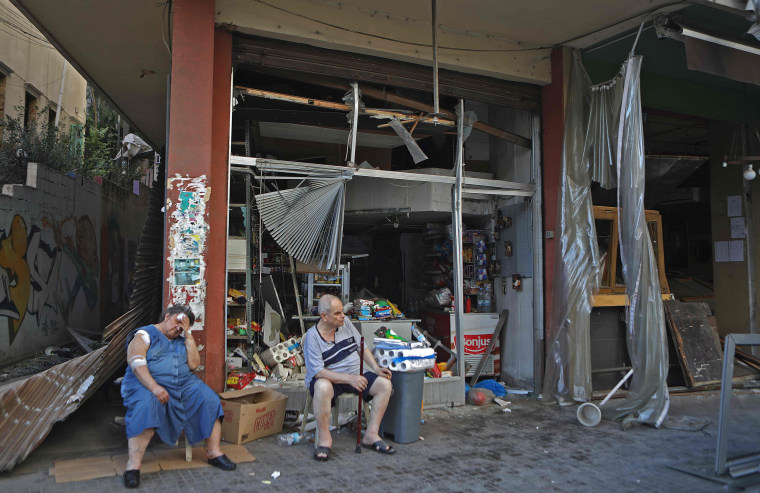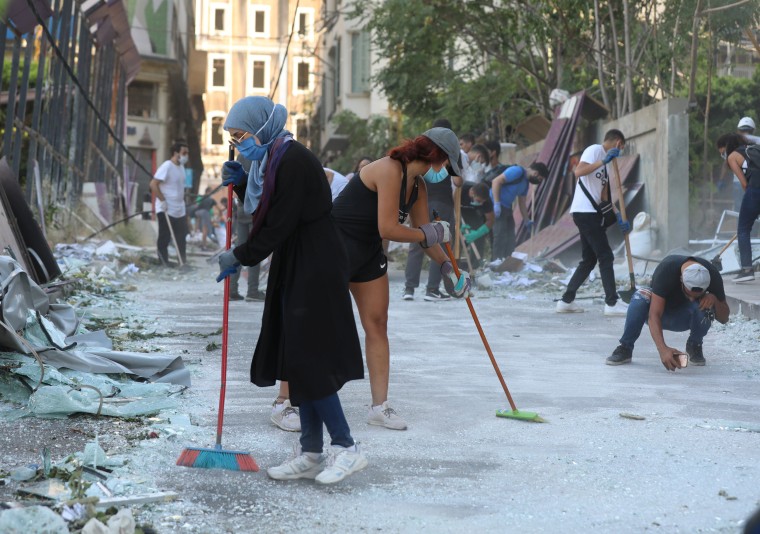BEIRUT — When the blast slammed into his hospital, Dr. Ibrahim Melki leaned into the mayhem.
Doctors and nurses at the Trad Hospital in Beirut rushed to remove shrapnel and shards of glass from hundreds of wounded people. But the tiny 60-bed hospital was quickly overwhelmed.
"I've never seen something like this," the surgeon told NBC News. "We were never prepared for something this big."
With more than 200 injured casualties flowing into the private hospital immediately after Tuesday's catastrophic explosion, Melki called the aftermath of the blast "apocalyptic."
The doctor now fears a shortage of medical supplies and the lingering coronavirus, dismayed that swaths of his city have been destroyed.
"We went through years of wars...I've never, ever seen such destruction," he said. "I don't know how people are going to rebuild ... we are really numb."
As the resilient capital of more than 2 million — which for years has hosted refugees from neighboring countries and been no stranger to war — tries to pick up the pieces, the death toll rose to at least 137 on Thursday with 5,000 injured, officials said, with numbers likely to climb.
As the dust settles on the city still reeling from Tuesday's colossal explosion, sadness is turning to anger and fingers are being pointed at the beleaguered government already grappling with spiraling economic and political crises.
"The people demand the fall of the regime," chanted hundreds protesting in the Mar Mikhael downtown area on Thursday, calling for "revolution," as they lay blame for the catastrophe on what they see as the state's negligence.
Download the NBC News app for breaking news and politics
French President Emmanuel Macron was mobbed by angry crowds as he arrived in Beirut on Thursday to meet with political leaders, in the European country's former colonial protectorate.
Yelling at Macron in English, one woman accused him of meeting with "warlords" and said political leaders had failed the population during the crisis.
"They did this to us!" she shouted. "We are the ones who are building Lebanon...no one cares about us."
Shaking hands and hugging members of the crowd, Macron said he had come to deliver some "home truths." Adding, that French aid would not go to "corrupt hands" and that he would seek a new deal with political authorities.
"If reforms are not carried out, Lebanon will continue to sink," he told the crisis-hit country.
"This explosion should be the start of a new era."

Lebanese officials have promised investigations and accountability after an estimated 2,750 tons of ammonium nitrate were stockpiled at the city's port in a densely populated neighborhood. The chemical compound, which is commercially available, is often used in fertilizers and explosives.
Although some port officials have been placed under house-arrest, it is still unclear what exactly triggered the mighty explosion that flattened the area and sent a mushroom cloud of orange smoke across the city, blowing out windows and decimating homes — heard as far away as Cyprus.
"Those responsible will be held accountable whomever and wherever he is," Interior Minister Mohammed Fahmi told reporters Wednesday after he inspected the port, adding that the investigation will take a maximum of five days.
Others, including former prime ministers, have called for an international investigation led by the United Nations or Arab League, the Lebanese news agency reported, as the country enters a two-week state of emergency.
France has also sent humanitarian aid along with the U.S., Qatar and Israel. Condolences have poured in from world leaders including Britain's Queen Elizabeth II and Pope Francis. While the German foreign office confirmed on Thursday that a German embassy staff member had died as a result of the explosion.
At least one U.S. citizen has been killed, and several more injured, a U.S. State Department spokesperson said Wednesday, adding that all U.S. personnel in Beirut were safe and accounted for.
Abbie Cheeseman reported from Beirut, Adela Suliman and Susan Archer from London. Reuters contributed to this report.


